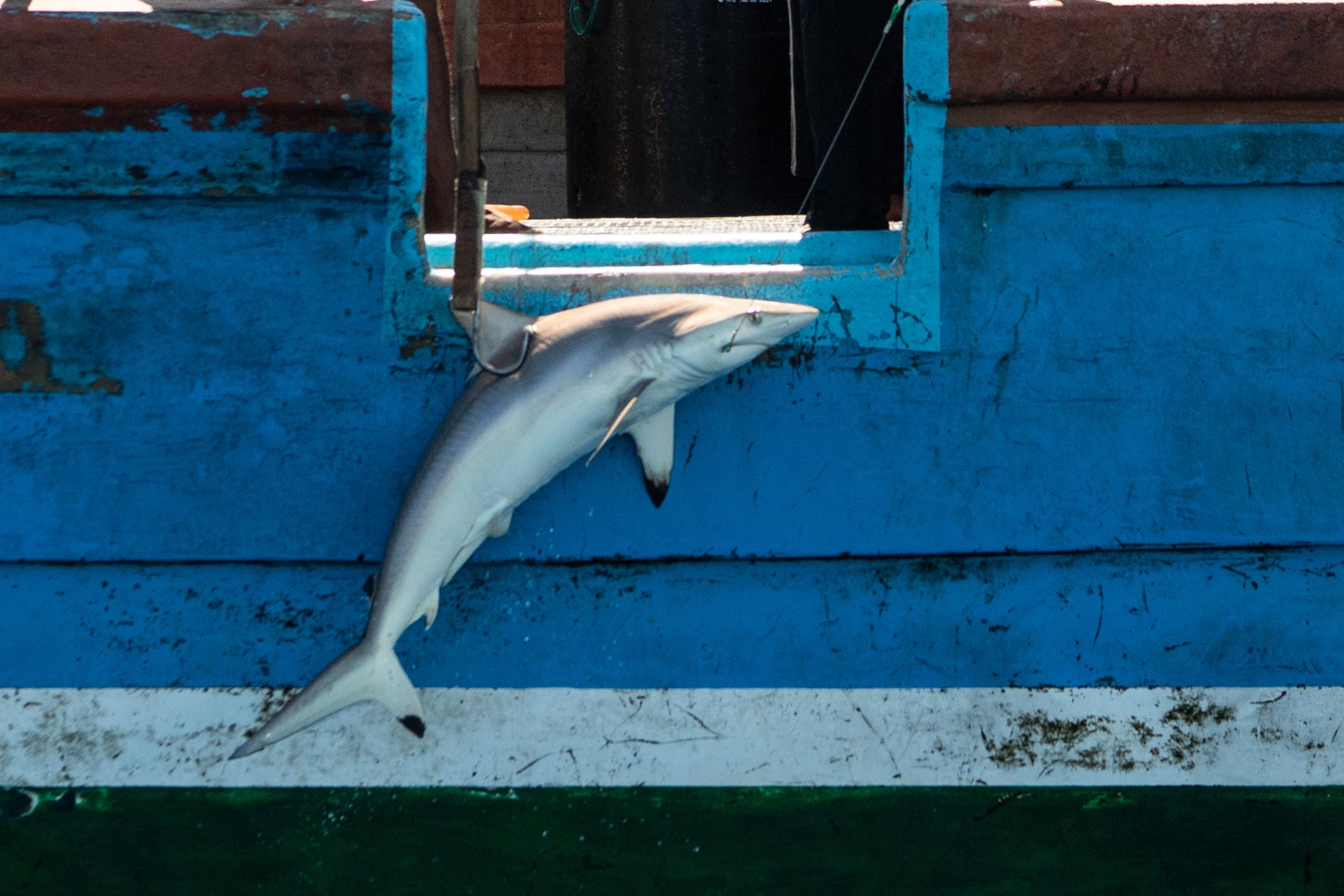Industrial fishing is destroying marine ecosystems, and the communities that depend on them
Approximately 35 per cent of longline catch is non-target species, and many vessels engage in illegal activities such as shark-finning, with impacts that ripple through the whole ecosystem


Your support helps us to tell the story
From reproductive rights to climate change to Big Tech, The Independent is on the ground when the story is developing. Whether it's investigating the financials of Elon Musk's pro-Trump PAC or producing our latest documentary, 'The A Word', which shines a light on the American women fighting for reproductive rights, we know how important it is to parse out the facts from the messaging.
At such a critical moment in US history, we need reporters on the ground. Your donation allows us to keep sending journalists to speak to both sides of the story.
The Independent is trusted by Americans across the entire political spectrum. And unlike many other quality news outlets, we choose not to lock Americans out of our reporting and analysis with paywalls. We believe quality journalism should be available to everyone, paid for by those who can afford it.
Your support makes all the difference.The Greenpeace ship Arctic Sunrise is five days from land in any direction. This part of the Indian Ocean is an empty expanse – days can pass without sighting other vessels.
But not for long: we are here to document destructive fisheries and expose how the industrial food production system is threatening this unique region. The first ships we come across are known as longliners, a type of commercial fishing vessel, where a “long line” – sometimes up to 100km long – is laid with incremental baited hooks placed in estuaries off its length. At times, before even catching sight of the vessel, we spot buoys in the water keeping the fishing line afloat.
Longliners are efficient killing machines. Along with their target catch of tuna, they bring in a high number of already threatened sharks as “bycatch’”. Approximately 35 per cent of longline catch is non-target species, and many vessels engage in illegal activities such as shark-finning, with impacts that ripple through the whole ecosystem.
Sharks are a species vulnerable to overfishing because they can take between 10-15 years to reach maturity and may bear just one pup a year. As top predators, they play an important role in maintaining the balance of the ecosystem, taking out larger predatory fish and allowing herbivore fish species to maintain a balance between macroalgae and corals. As children, we are taught to fear sharks, but above water and impaled with a fishing hook, it is not an equal match.
This region is also frequented by European purse seiners, especially from France and Spain, who use Fish Aggregation Devices (FADs) to attract schools of fish, which are then encircled with nets up to 2km long and 200m deep.
We come across a FAD on the still tropical waters: an unusual construction of buoys, nets, plastics and ropes. Birds are perching on the small float, and through the surface of the water, we see schools of fish and six sharks circling around the mini-ecosystem. The use of FADs in the region has become so widespread that scientists claim they are changing the entire ecosystem – by, for example, changing marine-life migratory patterns.
Purse seiners using FADs catch the largest share of yellowfin tuna, a species that has for several years been recognised as overfished in the Indian Ocean.
Yellowfin tuna are torpedo-shaped, with yellow sides and a silver belly. As a predator, like sharks, they also assist in maintaining a balanced ocean ecosystem. Unfortunately, purse-seiners catch juvenile tuna – tuna caught too young to reproduce – meaning that yellowfin tuna is in a critical state.
Scientists warn that the population could collapse as early as 2024, unless catch is reduced by at least 20 per cent. Despite calls from retailers such as the Global Tuna Alliance, alongside conservationists, fisheries associations, and more ambitious proposals from Indian Ocean coastal states, the European fishing industry is blocking agreements to reduce catch – and during the Indian Ocean Tuna Commission’s last meeting, destructive fisheries were allowed to go on unchecked.
The actions of a few powerful fishing nations and companies are impoverishing coastal communities that are dependent on small-scale fishing for their survival: as a financial lifeline and to meet nutritional needs.
This way of life is quickly becoming non-viable in the many regions where industrial fishing out at sea has drastically reduced fish numbers. Fishermen need to travel further out – sometimes hundreds of kilometres on tiny boats – for less catch, sold at a lower cost.
Well-managed fisheries are also critical to food security: fish provides almost half the world’s population with a significant portion of their animal protein intake.
One of my crewmates tells me about a previous Greenpeace voyage down the west coast of Africa. Many of the fishermen they spoke to were considering the treacherous journey north, through Libya, to Europe: the insatiable and easy consumption of fish in the West directly driving economic precarity and migratory flows elsewhere.
It would be an oversight to write an article about fishing without mentioning Seaspiracy, the documentary currently topping Netflix charts around the world. It’s a powerful film if you haven’t seen it – and one I would recommend – alongside an acknowledgement of the scientifically-driven reflections from the marine-protection community, which balance some of its claims.
It may be true that those in the West can influence change through our purchasing power, should enough people get on board with reducing fish intake. But many in the world rely on fishing for their economic and nutritional survival, and those least responsible for ocean destruction are often most impacted.
As such, Greenpeace and others are campaigning for a strong Global Ocean Treaty, supporting the rights of local communities and small-scale fishermen who rely on the oceans as livelihoods and food for their families. We need to continue to challenge industrial food production systems that destroy ecosystems, while working to ensure human dignity and wellbeing.
Dr Rita Issa is an NHS GP and onboard medic for Greenpeace’s boat Arctic Sunrise. This is the third article in her series from the Indian Ocean for the Independent: read the others here
Join our commenting forum
Join thought-provoking conversations, follow other Independent readers and see their replies
Comments